What Is Chia
Chia seeds were valuable sources of energy and medicine in the Mayan period. Popularly cultivated in Central and South America then Southeast Asia and Australia.
The term “chia” literally means strong. They’re available in black, spotted black, white and gray and one to two millimeters in size.
These tiny seeds when soaked in water can fill you up for up to 24 hours!
Here's a quick overview of what's in this article:
Health Benefits of Chia Seeds
Chia Nutritional Contents
How much chia do you need daily?
Where to buy and what to look for when buying chia seeds?
How to prepare chia?
How to make chia eggs
Can you lose weight with chia?
Does chia have side effects?
How to store chia properly
Chia recipes
Top 9 Health Benefits of Chia Seeds
1. High protein content.
Chia seeds provide a high content of omega-3 and omega-6 fatty acids in the ideal ratio of 3:1.
Chia seeds are also excellent sources of vegetable protein; containing all 8 essential amino acids which is quite unique for a vegetable protein source.
Since they have all the essential amino acids, chia seeds are a good protein supplement to vegetarian or vegan diets.
However, not advisable to growing children due to very little lysine content.
2. Rich in minerals and trace elements.
Chia contains large amounts of calcium, magnesium, copper, zinc and iron. The trace element boron also supports calcium absorption.
The seeds also have hormone-regulating, immune-building and muscle-healing effects.
3. High quality fiber.
Because of the very high fiber content of chia seeds, they slow down the breakdown of carbohydrates into sugar thus providing long-lasting energy.
This effect is also beneficial for athletes and people with regular cravings or for diabetics.
For athletes and those on a diet, the desire for sweets or junk food are decreased. For diabetics, blood sugar levels are controlled.
4. Neutral taste.
Chia is tasteless so they can be added to any food. These seeds also increase the satiety effect of the food and can indirectly help with weight loss.
5. Gluten-free.
They’re a good alternative to protein-rich cereals for people with gluten intolerance or celiac disease.
6. Improves digestion.
The soluble fibers help prevent constipation and cleanse the intestines helping remove waste. This means more nutrients can be absorbed again.
Chia can also alleviate heartburn and reduce the risk of various diseases.

7. Water retention.
If chia seeds are soaked before consumption, they can store large amounts of liquid and help maintain water balance in the body without being heavy on the stomach especially during exercise.
8. Rich in antioxidants.
They are so rich in antioxidants that they protect their own fatty acids for a period of four years and can be easily stored for four to five years without losing their nutritional content, taste or smell.
By enough supply of antioxidants, skin aging and free radical damage can be prevented.
9. Reduces risk of cardiovascular diseases.
High blood pressure increases the risk of cardiovascular diseases--we’re all aware of that.
The high omega-3 fatty acid content of chia lowers the risk of cardiovascular diseases, improves blood lipid and cholesterol levels and lowers blood pressure.
Chia Nutritional Content
Chia seeds are not called "superfood" for nothing. The seeds are the perfect protein supplier for vegetarians and vegans who don’t use animal products but still want to eat a protein-rich diet and build muscle.
Calcium
Chia seeds’ calcium content is five times more than milk. 630 mg of calcium per 100 g of chia. If you eat 15 grams of chia seeds a day, you simply add 100 mg of calcium. You can reach your daily requirement of calcium of 1000 mg without dairy products.
Iron
The iron in chia seeds is twice as much in spinach. 15 grams of chia seeds provide 1 mg of iron, which accounts for 7 to 10% of the daily requirement.
If you’d rather reach this amount of iron with baked goods, you’d need to eat two large slices of mixed bread at 50 g each.
Zinc
The zinc content of 15 grams chia seeds is 0.7 mg. You can get this amount from a cheese slice, however, dairy intolerance or vegan, zinc from chia seeds are an easy alternative.
Vitamin B3
The vitamin B3 content of chia seeds are unusually high. They are over 8 mg per 100 g chia seeds, far higher than animal products.
Vitamin B3 is involved in many body processes like detoxification, fat loss, carbohydrate metabolism, regeneration and much more.
Dietary fiber
The typical western diet contains very little dietary fiber which causes digestive problems ranging from constipation to colon cancer.
Chia seeds contain 34 g of fiber. Soaking chia seeds creates a so-called gel made from soluble fiber which in contrast to insoluble fiber, is more digestible and effective.
The fibers improve the intestinal flora, absorb toxins in the digestive tract, regulate blood sugar and cholesterol levels and increase bowel movement.
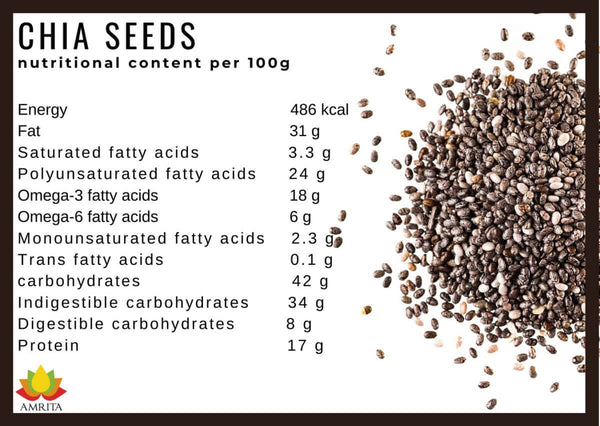
How much chia is recommended daily?
Since chia seeds absorb a lot of water and swell quickly, you should not exceed the daily intake of 2 tablespoons or 28 grams. And it’s important to drink plenty of fluids when eating chia seeds.
Where to Buy Chia?
Chia seeds are now common in supermarkets, grocery stores, health food stores and online.
If you’re buying, look for the nutritional value as different brands have different quantities due to the soil in which the chia seeds were grown.
Moreover, different colors (black and white) chia seeds have the same nutrient composition unlike quinoa.
How to prepare or cook chia?
Chia can be used and prepared in many ways. Its versatility can be used in hearty and sweet recipes.
Soak
Chia seeds swell enormously with water or milk and slightly increase their volume tenfold.
If you put 2 tablespoons of pre-soaked seeds in a glass of orange juice for breakfast, you will feel full until noon. Mix a tablespoon of chia with three times the amount of liquid, stir and wait a quarter of an hour for the mixture to thicken. You can mix the seeds with water, milk, or juice and season with cocoa powder or cinnamon.
Soaked seeds are perfect egg replacements when baking vegan delicacies.
Sprinkle
Use raw chia seeds and sprinkle them over muesli, yogurt or salads.
Bake
As an added nutrient, chia seeds can be baked in bread or pastries.
Roast
Cooking chia seeds destroys most of the important ingredients.
However, roasting chia seeds can be done. You can roast the seeds in a coated pan without any oil for 2 to 3 minutes. And serve directly.
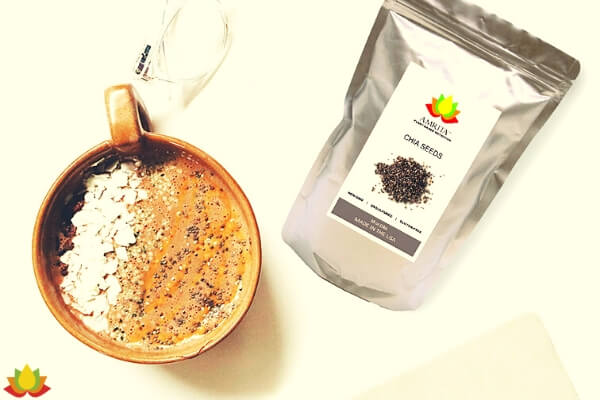
Ground
Studies have shown that ground chia is the best form to consume.
You can ground the seeds with a conventional grain or even coffee grinder. Then eat immediately because ground chia seeds spoil fast. You can add ground chia into your coffee, cocoa and other drinks.
Additionally, ground chia combined with water, lemon juice and honey forms chia gel. A recipe for long-distance runners.
Oil
If you squeeze out the small seeds, approximately 40% oil can be extracted. Chia oil provides ALA and linoleic acid. Be careful when buying your chia oil, pay attention to the manufacturing process. Too much heat, water or chemicals will cause nutrient loss.
How to make chia eggs?
Stir a tablespoon of chia seeds to 3-4 tablespoons of water. Leave for 20 minutes before adding to your other ingredients.
The seeds swell in the water and form a sticky substance that resembles an egg.
This alternative is suitable for short pastries, breads or biscuits. For a finer dough texture, you can grind the seeds before mixing them with the water.
Tip when using chia seeds as an egg replacement
If you don’t like to grind your chia seeds, you can simply use chia flour. You can find this online or in health food stores.
Powdered chia seeds can be added to any mass of dough or sauce and still has the same nutrients as the whole seeds. And you won’t even notice that seeds were used.
On the flip side, if you don’t want the flour, you can make your own ground chia seeds with a grinder.
In a mixer, just add water in your chia seeds and mix at the highest level for a minute.
Is chia good for weight loss?
Proteins are digested more slowly by the body than most carbohydrates and have been proven to keep you full longer.
The protein chia seeds contain are essential amino acids that the body can absorb easily. They can be easily integrated into any meal, eaten raw, mixed in juices or baked goods.
However, those who claim that weight loss can be achieved by eating chia seeds alone is fundamentally incorrect.
Scientific studies have shown that eating a certain food cannot lead to weight loss.
Chia seeds have beneficial nutrient composition, when included in a balanced and healthy diet and regular exercise can support weight loss.
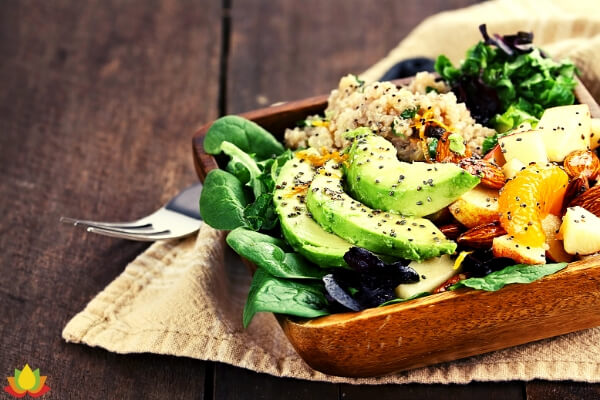
Chia seeds vs Flax seeds?
1. Versatility
Chia seeds can be used or eaten raw or mixed with other ingredients and maintain their nutrients. While flax seeds must be crushed before consumption because its nutrients are in the husk of the seed.
The polysaccharide layer under its shell gives flax seed a larger effect than chia but immediate consumption is needed because it will decompose fast.
2. Price
Flax seeds, on average, only cost a third of what you have to pay for chia seeds.
3. Nutrients
Chia seeds contain a little more omega-3 fatty acids and antioxidants, but they also have a slightly higher carbohydrate content, which makes them less calorie-rich than flax seeds.
4. Shelf life
Chia seeds contain several antioxidants that preserve their shelf life. Unlike flax seed, when it’s ground, it loses its nutrients and needs to be consumed right away.
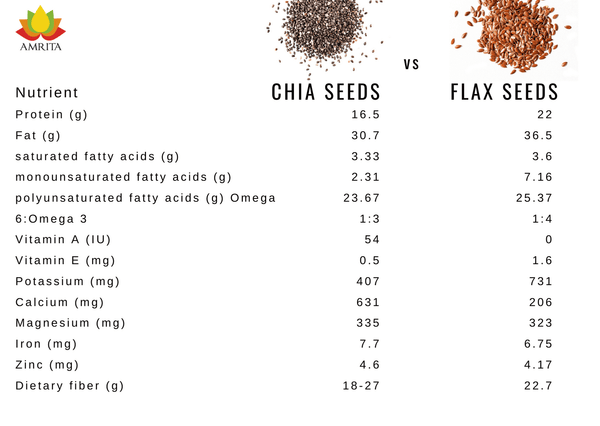
Does chia have side effects?
In addition to the valuable ingredients and benefits of chia seeds, there are side effects too.
Here are some of the common side effects of chia:
1. Allergic reactions from chia seeds
Chia seeds are not known to cause allergies. But there have been reports from people who experienced allergic reactions like skin rash, urticaria, watery eyes, difficulty breathing and swollen tongues.
Allergic reactions can occur due to chia proteins known to be allergens. If you’re allergic to mustard, sage, rosemary or thyme, be careful when eating chia.
On the other hand, studies are currently being carried out because chia is supposed to contain the antioxidant quercetin, which has an inhibitory effect on the production and release of histamines.
2. Water absorption
Due to chia’s water absorption, it is recommended to increase fluid intake enough when you eat them.
Especially if you don't let them swell in water first, because then they will absorb the moisture in your stomach.
Similarly, the high fiber content can lead to digestive problems. To avoid bloating or diarrhea, the intake of high-fiber foods should be done gradually while increasing fluid intake.
3. Interaction with Meds
If blood thinners, hypotensive or moisturizing medication, ask your doctor if you can eat chia seeds.
There may be interactions in the body between the components of chia seeds and blood-thinning medicines.
How long will chia last?
If stored in airtight containers and stored in a dark and cool place, chia seeds can last for several years.
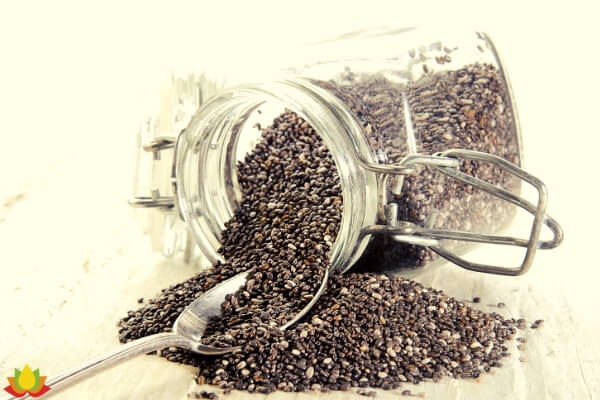
Chia Recipes
QUICK & EASY VEGAN CHIA PUDDING
CHIA AND BERRY SMOOTHIE
OVERNIGHT CHIA SEED PUDDING
BLUE SPIRULINA SMOOTHIE BOWL
Related Articles:
SUPERFOOD QUINOA: BENEFITS, NUTRITION, RECIPES, TIPS
SUPERFOOD SPIRULINA: NUTRITION, BENEFITS, TASTE, RECIPES, WHERE TO BUY


1 comment
Very informative, will definitely incorporate chia in my diet